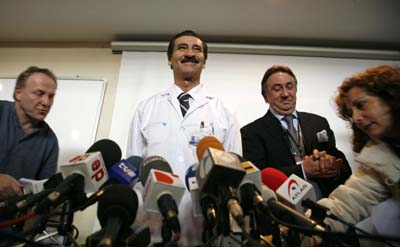Castro doesn't have cancer - doctor
(AP)Updated: 2006-12-27 06:37
MADRID - A Spanish surgeon who treated Fidel Castro said the ailing Cuban leader does not have cancer, insisting Tuesday he was recovering slowly but progressively from a serious operation.
Garcia Sabrido visited Havana last week to examine Castro and consult with his medical team.
"He hasn't got cancer," Garcia Sabrido said, adding that he believed Castro could be physically capable of running the country again. "While respecting confidentiality, I can tell you that President Castro is not suffering from any malignant sickness."
Castro, 80, has not appeared in public since temporarily ceding power to his younger brother, Raul, after his surgery this summer. Garcia Sabrido declined to give precise details about Castro's condition, but said it was "a benign process in which there have been a series of complications."
Cuban authorities have denied Castro is suffering from terminal cancer as U.S. intelligence officials have claimed, but his prolonged absence has fueled increasing speculation that he will not return to power.
Asked whether he thought Castro would be physically capable of once again governing Cuba, Garcia Sabrido said: "If his recovery is absolute, then naturally, yes."
"I think that in these moments his decision to delegate power implies that he must now be dedicated to his recovery. What happens in the future will be an absolutely personal matter."
He said he was impressed by Castro's good spirits.
"His intellectual activity is intact, I'd say fantastic," the surgeon said. "I was amazed at his capacity to relate personal and historical anecdotes."
"He wants to return to work every day but medical recommendations demand caution," he said, adding that one of the problems the Cuban medical team had was limiting Castro's activities.
Some U.S. doctors believe Castro may suffer from diverticular disease, which can cause bleeding in the lower intestine, especially in people over 60. In severe cases, emergency surgery may be required.
Garcia Sabrido's specialty is in the digestive system and in transplants. In 1988, he wrote in the medical journal Archives of Surgery about a temporary stomach "zipper" that Spanish doctors had used on patients to provide repeated easy access for draining and treating abdominal infections.
On Monday, Spanish authorities confirmed that Garcia Sabrido had traveled to Cuba's capital with advanced medical equipment to determine if Castro needed additional surgery. However, Garcia Sabrido said Tuesday that another operation was not immediately necessary.
"It is not planned that he will undergo another operation for the moment," he said. "His condition is stable. He is recovering from a very serious operation."
There was no mention of Garcia Sabrido's visit in Cuba's state media.
|
||
|
||
|
|

